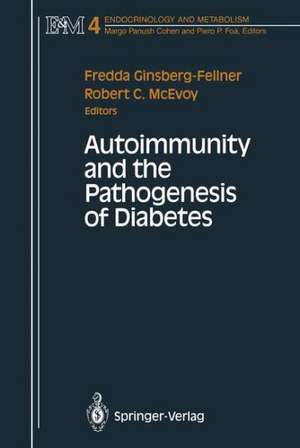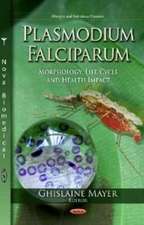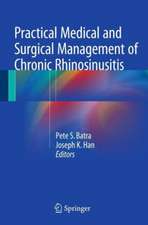Autoimmunity and the Pathogenesis of Diabetes: Endocrinology and Metabolism, cartea 4
Editat de Fredda Ginsberg-Fellner, Robert C. McEvoyen Limba Engleză Paperback – 30 sep 2011
Preț: 369.84 lei
Preț vechi: 389.31 lei
-5% Nou
Puncte Express: 555
Preț estimativ în valută:
70.78€ • 73.62$ • 58.43£
70.78€ • 73.62$ • 58.43£
Carte tipărită la comandă
Livrare economică 12-26 aprilie
Preluare comenzi: 021 569.72.76
Specificații
ISBN-13: 9781461279204
ISBN-10: 1461279208
Pagini: 316
Ilustrații: XII, 296 p.
Dimensiuni: 155 x 235 x 17 mm
Greutate: 0.45 kg
Ediția:Softcover reprint of the original 1st ed. 1990
Editura: Springer
Colecția Springer
Seria Endocrinology and Metabolism
Locul publicării:New York, NY, United States
ISBN-10: 1461279208
Pagini: 316
Ilustrații: XII, 296 p.
Dimensiuni: 155 x 235 x 17 mm
Greutate: 0.45 kg
Ediția:Softcover reprint of the original 1st ed. 1990
Editura: Springer
Colecția Springer
Seria Endocrinology and Metabolism
Locul publicării:New York, NY, United States
Public țintă
ResearchCuprins
1. The Autoimmune Hypothesis of Insulin-Dependent Diabetes: 1965 to the Present.- Autoimmunity.- The Concept of IDDM as an Autoimmune Disease.- The Association Between IDDM and HLA.- Etiologic Factors with Implications for the Pathogenesis of IDDM.- The Autoantigen in IDDM.- Presentation of Autoantigen.- Autoantigen Recognition in IDDM.- The Effector Phase in IDDM.- Conclusion.- 2. Immunogenetics and the Pathogenesis of Insulin-Dependent Diabetes Mellitus.- Genetic Background.- Environmental Factors.- Speculations on the Mechanism of IDDM Pathogenesis.- 3. Association of Insulin-Dependent Diabetes Mellitus and Other Autoimmune Diseases.- IDDM and Thyroid Autoimmunity.- Other Endocrinopathies Associated with Type 1 Diabetes Mellitus.- How Does Autoimmune Disease Develop?.- Can Autoantibodies Affect More Than One Gland? Are They Mono- or Polyclonal?.- Summary and Conclusions.- 4. The Humoral Anti-Islet Immune Response: Cytoplasmic Islet-Cell Antibodies: Technical Aspects and Clinical Applications.- Assays for ICA Determination.- Approaching Standardization of the Cytoplasmic ICA Test.- Clinical Application of the ICA Test.- Synopsis, Recommendations, and Conclusions.- 5. The Humoral Anti-Islet Response: Biochemical Characterization.- Autoantigens Detected in Human Islets.- Autoantigens May Define Disease Specificity in Human Autoimmunity.- Western Blotting Analysis of Islet Autoantigens.- Analyzing Circulating Immune Complexes in Diabetes.- Summary.- 6. The Humoral Anti-Islet Immune Response: Immunochemical Studies of Glycoconjugate Antigens.- What Are Gangliosides?.- Immunochemical Characterization of Monoclonal Antibody-Defined, Islet-Cell Antigens.- Immunochemical Properties of the Autoantigen(s) of Pancreatic Islets.- Extraction and Partial Purification of the ICA Glycolipid Antigen.- Glycolipid Antigens in Animal Models of Type I Diabetes.- Multiplicity of Antigens in Humoral Autoimmunity of Type I Diabetes.- Monoclonal Antibody-Defined, Islet-Cell Glycolipid Antigens.- Physiological Roles of Islet-Cell Gangliosides.- Antibodies to Glycolipids in Diseases Other than Type I Diabetes Mellitus.- Immunogenicity of Glycolipids.- T-Cell Reactivity to Glycolipid Antigens.- Final Comments.- 7. Insulin Autoantibodies.- 8. Cell-Mediated Anti-Islet—Cell Immune Response: Clinical Experience and Lessons from Animal Models.- Cell-Mediated, Anti-Beta—Cell Autoimmunity in Human Diabetes.- Diabetes Induced by Multiple, Subdiabetogenic Doses of Streptozotocin.- Diabetes in the Bio-Breeding Rat.- Diabetes in Nonobese Diabetic Mice.- Summary and Conclusions.- 9. The Pathogenesis of Immunologically Mediated Diabetes.- Mechanism of the Disease Process.- Disease Recurrence Model.- Disease Recurrence in Islet Grafts is CD4 T-Cell Dependent.- Free Radical Involvement in the Disease Process.- Disease Recurrence in the Grafted Tissue: A Summary.- Lessons from Fetal Pancreas Transplantation.- Effect of Cyclosporine on Disease Recurrence.- 10. Viral Pathogenesis of Insulin-Dependent Diabetes Mellitus.- Direct Cytolytic Viral Infection of Beta-Cells.- Association of Virus Infection with Autoimmune IDDM.- Persistent Infection of Pancreatic Beta-Cells and Mild Hyperglycemia.- Conclusion.- 11. Immune Intervention in Diabetes: State of the Art and Future Directions.- Experimental Immunotherapy in IDDM of Recent Onset.- Open Studies of Immunomodulatory Therapies in IDDM.- Randomized Control Trials of the Effects of Cyclosporin in IDDM.- Efficacy and Safety of Immunosuppression in Remission Induction in IDDM.- Timing of Immunomodulatory Interventions in IDDM.-IDDM in Remission: Endocrine Metabolic Status and Its Possible Implications.- Strategies for Continuing Studies of Immunotherapy in IDDM.- Summary and Conclusions.

















